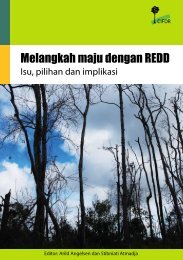Adaptive collaborative management of community forests in Asia ...
Adaptive collaborative management of community forests in Asia ...
Adaptive collaborative management of community forests in Asia ...
Create successful ePaper yourself
Turn your PDF publications into a flip-book with our unique Google optimized e-Paper software.
Chapter 1: Introduction: People, Forests and the Need for Adaptation • 5<br />
human be<strong>in</strong>gs. Whereas systems <strong>management</strong> <strong>in</strong>volves <strong>management</strong> <strong>of</strong><br />
complex <strong>in</strong>teractions by actors with differ<strong>in</strong>g, even oppos<strong>in</strong>g objectives,<br />
what is called for is decision-mak<strong>in</strong>g based on negotiation around these<br />
differ<strong>in</strong>g objectives. L<strong>in</strong>ear th<strong>in</strong>k<strong>in</strong>g based on supposedly clear objectives<br />
doesn’t work 1 because real-world forest <strong>management</strong> <strong>in</strong>volves s<strong>of</strong>t systems,<br />
with compet<strong>in</strong>g societal objectives. Collaboration becomes essential.<br />
In recent years, an enormous amount <strong>of</strong> literature has been produced<br />
on the broad subject <strong>of</strong> collaboration <strong>in</strong> natural resource <strong>management</strong>.<br />
Collaborative <strong>management</strong> <strong>of</strong> protected areas has been one major area<br />
<strong>of</strong> concern (Borr<strong>in</strong>i-Feyerabend 1997); <strong>collaborative</strong> <strong>management</strong> <strong>of</strong><br />
<strong>forests</strong> has been another (Fisher 1995). Associated with this research is<br />
work on pluralist approaches to natural resources <strong>management</strong> <strong>in</strong> general,<br />
and forest <strong>management</strong> <strong>in</strong> particular (Anderson et al. 1998). There are<br />
differ<strong>in</strong>g views on who should be <strong>in</strong>volved <strong>in</strong> <strong>collaborative</strong> arrangements<br />
for forest <strong>management</strong>. One view holds that the ma<strong>in</strong> partners should<br />
be local communities (however def<strong>in</strong>ed) and the state authorities legally<br />
responsible for <strong>forests</strong>. In <strong>Asia</strong> these forest authorities usually have legal<br />
authority over most <strong>forests</strong>, despite the traditional claims <strong>of</strong> the people who<br />
live <strong>in</strong> and near <strong>forests</strong>. This type <strong>of</strong> <strong>collaborative</strong> <strong>management</strong> is reflected<br />
<strong>in</strong> the Indian model <strong>of</strong> jo<strong>in</strong>t forest <strong>management</strong> and the approaches to<br />
<strong>community</strong> forestry evident <strong>in</strong> forest <strong>management</strong> programmes <strong>in</strong> Nepal<br />
and the Philipp<strong>in</strong>es.<br />
Increas<strong>in</strong>gly, such <strong>community</strong>-based approaches are be<strong>in</strong>g seen as too<br />
narrow and it is recognised that the constituencies <strong>in</strong>terested <strong>in</strong> forest<br />
<strong>management</strong> are more diverse. Stakeholders may <strong>in</strong>clude both nonlocal<br />
groups with direct economic <strong>in</strong>terests <strong>in</strong> <strong>forests</strong> (such as logg<strong>in</strong>g companies<br />
and nontimber forest products merchants) and those with less immediate<br />
<strong>in</strong>terests, such as conservationists and the wider population that depends<br />
on <strong>forests</strong>’ environmental services (clean air and water). Although multiple<br />
<strong>in</strong>terests are fundamental to contemporary forest <strong>management</strong>, there are<br />
good reasons for concern that calls for pluralism and the national <strong>in</strong>terest<br />
can become excuses for disempower<strong>in</strong>g marg<strong>in</strong>alised stakeholders, <strong>in</strong>clud<strong>in</strong>g<br />
local communities whose rights have long been ignored (Fisher 2003a).<br />
Perversely, calls for pluralism risk re<strong>in</strong>forc<strong>in</strong>g (or <strong>in</strong> some cases, return<strong>in</strong>g<br />
to) the status quo, <strong>in</strong> which <strong>forests</strong> are controlled by state authorities and<br />
powerful economic <strong>in</strong>terests.<br />
Calls for pluralist forest <strong>management</strong> have raised questions about the need<br />
to develop processes and fora that permit stakeholder negotiation and, at
















